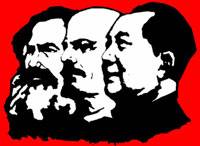 Word is in that two Maoist central committee members have publicly criticized rebel supremo Prachanda and his deputy, Dr. Baburam Bhattarai, for showcasing “non-proletarian tendencies.” Now that’s tantamount to accusing Girija Prasad Koirala of demanding the reinstatement of the Rastriya Panchayat dissolved in 1990 as part of the movement to restore full democracy.
Word is in that two Maoist central committee members have publicly criticized rebel supremo Prachanda and his deputy, Dr. Baburam Bhattarai, for showcasing “non-proletarian tendencies.” Now that’s tantamount to accusing Girija Prasad Koirala of demanding the reinstatement of the Rastriya Panchayat dissolved in 1990 as part of the movement to restore full democracy.In a statement, Rabindra Shrestha and Comrade Anukul, on behalf of the obscure “New Cultural Revolutionary Group,” have explained how ideological, political, organizational, military and cultural deflections have taken place among the two top leaders of the party.
Now, it would be premature to pronounce this development as a precursor to a formal split in a movement that almost imploded last year. For one thing, the signatories are totally capable of denying ever having made such a statement and of blaming the Royal Nepalese Army for concocting another “artless drama.” Moreover, Prachanda and Dr. Bhattarai can obfuscate on how the latest “misunderstanding” within the ranks had been resolved.
If the statement stands, then it would have serious implications for the rebel movement. Rabindra Shrestha, one may recall, was the man who was holding talks in November 2000 in the chambers of then-Deputy Prime Minister Ram Chandra Poudel while another act was being unfolded at the behest of Information and Communication Minister Jaya Prakash Prasad Gupta.
Gupta, supposedly acting on the instructions of then-Prime Minister Prasad Koirala, had produced two Maoist detainees – Dinesh Sharma and Dina Nath Gautam before TV cameras to denounce the Maoist “people’s war” before setting them free.
An infuriated Prachanda pulled out of the nascent peace process. A few hours later, the two detainees faxed reporters a statement recanting their denunciation of the Maoist leadership, saying it was extracted through state coercion.
Rabindra Shrestha was also the man who predicted, in successive articles in Maoist publications, how the Maoists were fully prepared to take on the military. His argument: the rebels were fighting for a cause while the soldiers were fighting for their careers.
Shrestha and Anukul cite Prachanda and Dr. Bhattarai’s war of words, the rebel supremo’s statement that his party would accept any outcome of constituent assembly elections, including one in favor of Panchayat-style active monarchy, as evidence of their deviant tendencies.
However, it’s the personal allegations that are the most damning. Shrestha and Anukul (believed to be central committee member Mani Thapa) accused Prachanda and Dr. Bhattarai of living in the safety of “foreign land” for eight out of ten years of the “people’s war.”
Furthermore, they lashed out at the top leaders for not sending their children in the frontline of the rebellion, contrary to what Prachanda and Dr. Bhattarai have long maintained.
The signatories have urged the “new generation” within the party to carry out “revolution within revolution” in a new way. Do Prakash Dahal and Manasi Bhattarai have any thoughts on the matter?